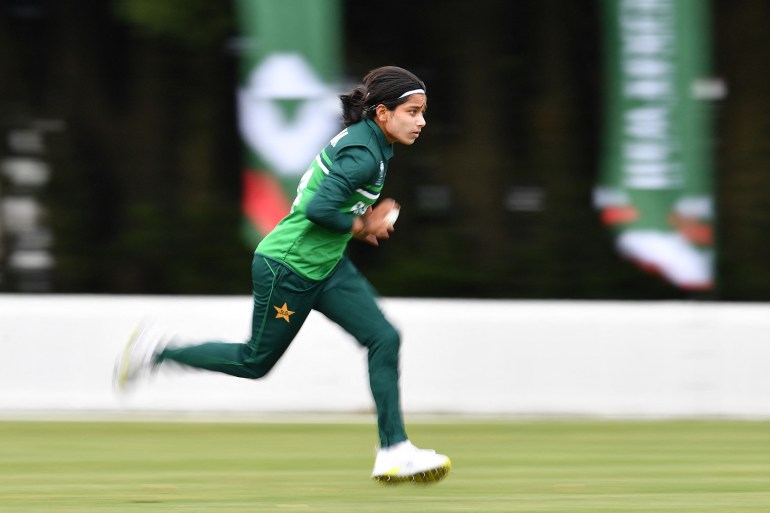Pakistani cricketer Fatima Sana’s first brush with captaincy came under far from ideal circumstances.
Standing in for then-captain Nida Dar, Sana walked up to the batting crease with her team four wickets down for 35 runs in the second match of a one-day international (ODI) series against New Zealand in Christchurch.
The fast-bowling all-rounder turned the tide with a pivotal innings of 90 not out off 104 balls – hitting seven fours and a six – and helped Pakistan post a target of 221. With the ball in hand, she took the crucial wickets of New Zealand’s leading batter Amelia Kerr and captain Sophie Devine. But Pakistan lost the match. Three days later, Sana led Pakistan to their first-ever away win over New Zealand.
In Sana, Pakistan had inadvertently discovered a bold young leader, capable of changing the team’s fortunes with her all-round skills.
Ten months on, the 22-year-old will lead Pakistan at the ICC Women’s T20 World Cup in the United Arab Emirates.
“When the Pakistan Cricket Board spoke to me about taking on the captaincy [in August], my entire career flashed before me,” Sana told Al Jazeera ahead of the tournament.
“I thought about my humble beginnings, and cried when I broke the news to my family.”
It has been a swift rise for Sana, who made her ODI and T20 international debuts as a 17-year-old in May 2019, and transformed into the leader of Pakistan’s bowling attack. Her 84 wickets across 82 international matches are the most for a Pakistani pacer since her debut.
.@imfatimasana named Pakistan captain for ICC Women’s T20 World Cup 2024 🚨
Our squad for the marquee event 🇵🇰#BackOurGirls pic.twitter.com/NWoF6RmyVH
— Pakistan Cricket (@TheRealPCB) August 25, 2024
A product of Karachi’s tape-ball street cricket culture
Sana’s cricket journey began in the early 2000s in Karachi, Pakistan’s largest metropolis.
“I was around 10 years old when my brother taught me how to rotate my bowling arm,” she recalled. “I could not send the ball across the pitch so he asked me to run in and then bowl, and it worked.”
Cricket is the most widely played sport in Pakistan and most international cricketers – men or women – get their first taste of the game on the streets. And Karachi – home to more than 20 million people – is known for its vibrant tape-ball cricket scene, which involves playing with a tennis ball covered with electric tape – to increase its speed and allow greater control when used on rugged neighbourhood streets.
Sana, too, is a product of Karachi’s decades-old street cricket culture.
Growing up as an aspiring fast bowler in Nazimabad, a famous middle-class suburb in Karachi’s northwest that is known as the city’s breeding ground of cricketers, Sana first honed her skills on the streets. Dozens of former international men’s cricketers, from legendary batter Hanif Mohamed to recent captain Sarfaraz Ahmed, learned their craft in Nazimabad.
Sana’s first opponents, though, were fairly less famous.
The youngest of five siblings, she began by bowling to her older brothers and their friends.
“I have played a lot of street cricket with my brothers,” Sana said, with a fondness for her siblings, and recalled how they would “fight with anyone who said I couldn’t play with them”.
The eldest, Shehroz Sana-ul-Haq, was an aspiring cricketer himself but walked away from the game in pursuit of a “stable profession” upon his parents’ insistence. However, he took it upon himself to ensure his sister lived her dream.
Shehroz taught Sana how to bowl fast, registered her at a local cricket academy and enrolled her in a zonal women’s cricket tournament.
Then aged 11, Sana was the tournament’s youngest player and stood out for her fast bowling.
“The girls were stunned and lifted me [in celebration] when I took my first wicket,” Sana laughed, recalling her first hard-ball cricket tournament that paved the way to competitive cricket.
During those early days, some coaches advised Sana to switch to spin bowling on the pretext that women usually prefer the slower form of bowling. However, Sana, a James Anderson and Shoaib Akhtar fan, would have none of it.
While Anderson’s control and swing left her in awe, Akhtar’s pace pushed her to bowl faster.

Breakthrough years
The aspiring pacer’s impressive performances propelled her career. She played under-21 cricket at the age of 13 and senior domestic cricket two years later.
Her career, though, really took off in 2019 when she was picked by then-Pakistan captain Sana Mir for a domestic T20 championship. Sana took seven wickets in as many matches for the eventual champions and made her way into the Pakistan team two months later.
“What impressed us [the selectors] the most about Fatima Sana was her desire to become a big player,” Marina Iqbal, former Pakistan cricketer and then-team selector, told Al Jazeera.
“I found her eager to learn from the experienced players – always full of questions about the game.
“Her keenness to perform well for the team and herself made her stand out. Pakistan needed a player like her, so we backed her.”
Sana repaid the selectors’ faith with impressive performances and won the PCB’s Emerging Cricketer of the Year award in 2020.
A year later, she went a step further by winning the International Cricket Council Women’s Emerging Cricketer of the Year award, becoming the first Pakistani woman to get on an ICC honours list.
The international recognition, and the performances behind it, opened the doors to international Twenty20 franchise leagues in the Caribbean, New Zealand and Dubai.
Sana credits that exposure for helping her grow as an international athlete.
“The players [from other countries] helped me identify my strengths and taught me how to improve as a cricketer,” she said.
Alhumdullilah ❤️
It’s an absolute honor to receive the trophy of @ICC Women’s Emerging Cricketer Of The Year.Onwards and upwards InshaAllah🤞🏼
Pakistan Zindabad 🇵🇰#iccawards2021 #icc #emergingcricketer #pcb #blessed pic.twitter.com/TPTtDiIp6p— Fatima Sana Khan (@imfatimasana) April 7, 2022
‘Lack of acceptance for women’s cricket’
Pakistan was one of the earliest Asian countries to enter women’s international cricket, in 1997.
Its domestic cricket structure for women is light years behind that for men and young boys. There is also a lack of dedicated women’s cricket clubs to train and nurture aspiring players.
The PCB runs regional cricket programmes via its academies for about 400 athletes in eight cities across Pakistan but that is just about it when it comes to facilities.
Apart from the academies, Sana believes women do not have many options when it comes to training.
“Coaches at local clubs are not ready to take the responsibility to train girls and let them compete with boys.
“There remains a lack of acceptance for women’s cricket.”
The PCB says it has increased its annual budget for women’s cricket by more than $600,000, but its women’s domestic and international fixtures remain limited.
The country still lacks a franchise-based T20 league, which Sana believes could offer great exposure to upcoming players.
Australia, England, India, New Zealand and the Caribbean have their own women’s T20 franchise tournaments, which attract international stars and offer local players an opportunity to showcase their abilities.
In 2022, the board said it would launch a women’s T20 league similar to the Pakistan Super League for men, but shelved the idea a year later. It now holds an annual domestic T20 competition that’s a far cry from glitzy franchise events.

‘Ticks all the boxes as a captain’
While it was pace bowling that fast-tracked Sana’s career, the all-rounder was eager to improve her batting and was encouraged by former Pakistan head coach David Hemp in 2020. Four years later, the results are evident.
Sana boasts the best batting strike rate (128.78) and the second-best batting average (34) among Pakistani batters in 2024.
Her ability to hit big shots makes her a valuable lower-middle-order batter in a team that struggles to score quick runs, especially going into a T20 World Cup.
Pakistan coach Muhammad Wasim believes Sana’s ability to lead from the front with bat and ball is a standout trait.
“Fatima Sana ticks all the boxes as a captain,” Wasim told Al Jazeera. “She understands the game very well and commands respect from the group.”
However, leading her team in an international tournament where they have historically failed to make an impression poses a different challenge for Sana.
Pakistan have never progressed past the group stage of a T20 World Cup. And with Group A opponents such as Australia, India, New Zealand and Sri Lanka, the women in green might struggle to shake off the unenviable record yet again.
In 2024, Pakistan have won only four of the 15 T20 matches, but the captain believes in her team’s ability to spring a surprise at the World Cup.
Her simple mantra is: “Play attacking cricket, handle the pressure better, and stay calm when the matches get tight.”
Sana recognises that Pakistan’s strength lies in their versatile bowling attack, but wants the batters to step up and post bigger scores to progress in global competitions.
“I want teams to be wary of facing us,” she said.
Her ideal brand of captaincy would be a concoction of her mentor Sana Mir’s honesty, England captain Heather Knight’s communication skills and former India men’s captain MS Dhoni’s calmness.
Leading a Pakistani cricket team – men’s or women’s – is one of the toughest jobs in the sport and one that comes with relentless scrutiny.
It is also one of the easiest jobs to lose, especially after a World Cup. Sana, though, remains undeterred and wants to “live in the present”.
“I want to give my best and enjoy this responsibility.”
The 🇵🇰 players are putting in the hard yards ahead of the Women’s #T20WorldCup 💪#WhateverItTakes pic.twitter.com/Nw2KNcPKNR
— T20 World Cup (@T20WorldCup) September 28, 2024









More Stories
Sunshine and cool 70s to start new month of October
Claudia Sheinbaum rindió protesta como presidenta de México
Can Israel root out Hezbollah?